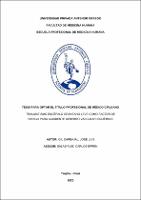Mostrar el registro sencillo del ítem
Traumatismo encéfalo craneano leve como factor de riesgo para accidente cerebro vascular isquémico
| dc.contributor.advisor | Salas Ruiz, Carlos Efren | |
| dc.contributor.author | Gil Carbajal, José Luis | |
| dc.creator | Gil Carbajal, José Luis | |
| dc.date.accessioned | 2020-03-12T12:57:15Z | |
| dc.date.available | 2020-03-12T12:57:15Z | |
| dc.date.issued | 2020 | |
| dc.identifier.uri | https://hdl.handle.net/20.500.12759/6143 | |
| dc.description.abstract | Determinar si el TEC leve es un factor de riesgo para ACV isquémico en pacientes que acuden a consulta del Servicio de Neurocirugía en el Hospital Regional Docente de Trujillo durante el periodo de Marzo 2019 a Diciembre 2019. Material y Métodos: Se llevó a cabo un estudio de tipo analítico, observacional, retrospectivo de casos y controles. La muestra del estudio estuvo constituida por 224 pacientes, 45 con Accidente cerebrovascular isquémico y 179 sin este, y se calculó el OR y la prueba de chi cuadrado. Resultados: La frecuencia de accidente cerebrovascular isquémico en pacientes con traumatismo encefalocraneano leve y en aquellos sin traumatismo encefalocraneano leve fue 28.9% y 5.6% respectivamente (OR 6.87; IC 95% 2.77-17.00; p = 0.000). El análisis multivariado mediante regresión identificó que las variables Hipertensión Arterial (OR ajustado 3.726; IC del 95%: 1.514 - 9.172; p = 0.004) y Diabetes Mellitus tipo 2 (OR ajustado 2.562; IC del 95%: 1.230 - 5.336; p = 0.012) mostraron asociación con la presencia de accidente cerebrovascular isquémico. Conclusiones: Se concluye que el Traumatismo Encéfalo Craneano leve es un factor de riesgo para Accidente Cerebrovascular isquémico en pacientes mayores de 20 años. Las variables con mayor significancia fueron la Hipertensión Arterial y la Diabetes Mellitus tipo 2. | es_PE |
| dc.description.abstract | To determine if Mild Traumatic Brain Injury is a risk factor for Ischemic Stroke in patients who come to the Neurosurgery Service at the Trujillo Regional Teaching Hospital during the period from March 2019 to December 2019. Material and Methods: An analytical, observational, retrospective casecontrol study was carried out. The study sample consisted of 224 patients, 45 with ischemic stroke and 179 without it, and the OR and chi-square test were calculated. Results: The frequency of ischemic stroke in patients with mild traumatic brain injury and in those without mild traumatic brain injury was 28.9% and 5.6% respectively (OR 6.87; 95% CI 2.77-17.00; p = 0.000). The multivariate analysis by regression identified that the variables Arterial Hypertension (adjusted OR 3,726; 95% CI: 1,514 - 9,172; p = 0.004) and Diabetes Mellitus type 2 (adjusted OR 2,562; 95% CI: 1,230 - 5,336; p = 0.012) showed association with the presence of ischemic stroke. Conclusions: It is concluded that Mild Traumatic Brain Injury is a risk factor for Ischemic Stroke in patients over 20 years. The most significant variables were Arterial Hypertension and Diabetes Mellitus type 2. | en_US |
| dc.description.uri | Tesis | es_PE |
| dc.format | application/pdf | es_PE |
| dc.language.iso | spa | es_PE |
| dc.publisher | Universidad Privada Antenor Orrego - UPAO | es_PE |
| dc.relation.ispartofseries | T_MED.HUMA_2756 | |
| dc.rights | info:eu-repo/semantics/openAccess | es_PE |
| dc.source | Universidad Privada Antenor Orrego | es_PE |
| dc.source | Repositorio Institucional - UPAO | es_PE |
| dc.subject | Traumatismo encéfalo craneano leve | es_PE |
| dc.subject | Accidente cerebro vascular isquémico | es_PE |
| dc.title | Traumatismo encéfalo craneano leve como factor de riesgo para accidente cerebro vascular isquémico | es_PE |
| dc.type | info:eu-repo/semantics/bachelorThesis | es_PE |
| thesis.degree.level | Título Profesional | es_PE |
| thesis.degree.grantor | Universidad Privada Antenor Orrego. Facultad de Medicina Humana | es_PE |
| thesis.degree.name | Médico Cirujano | es_PE |
| thesis.degree.discipline | Medicina Humana | es_PE |
Ficheros en el ítem
Este ítem aparece en la(s) siguiente(s) colección(es)
-
Medicina Humana [2774]

